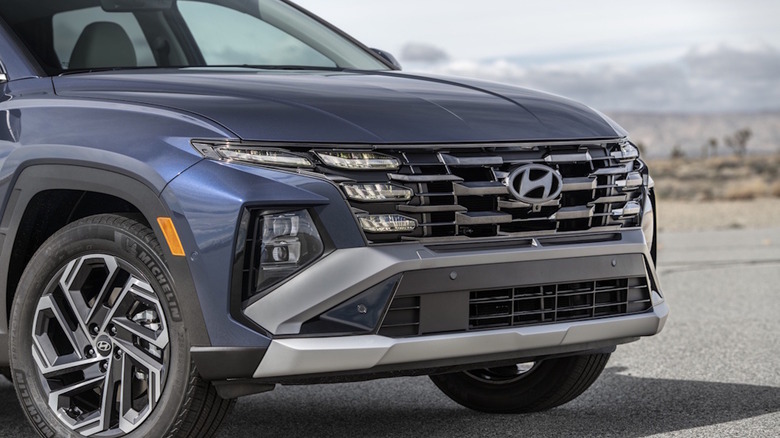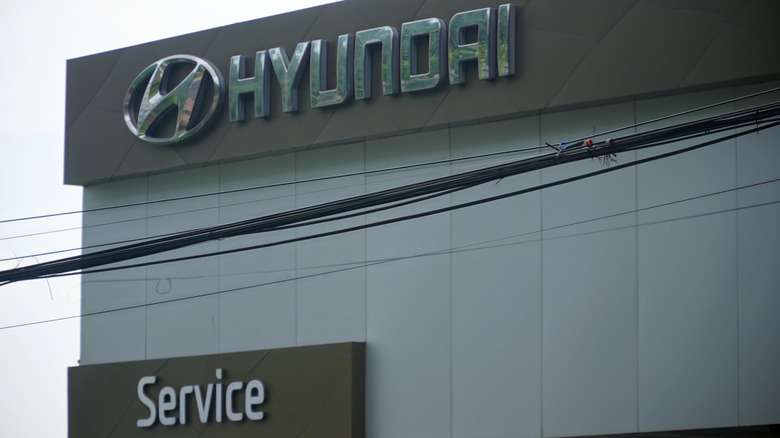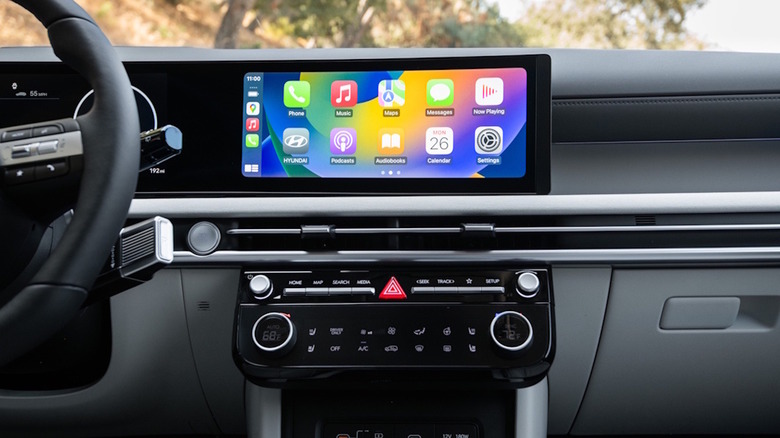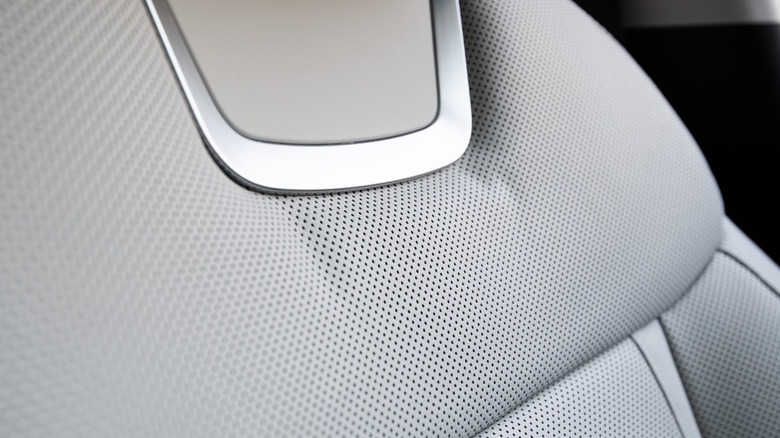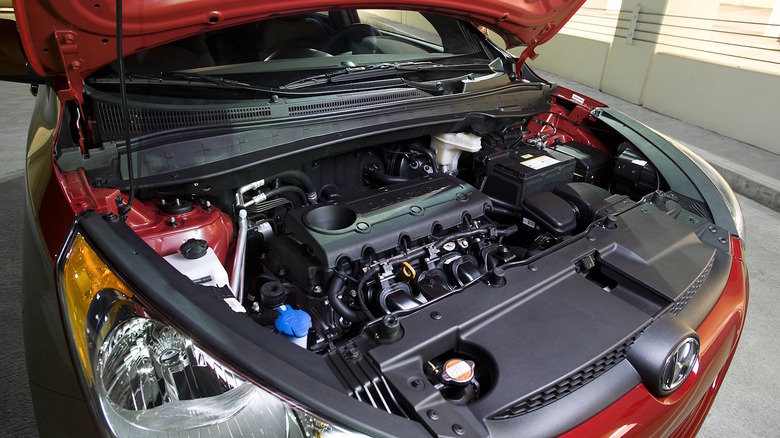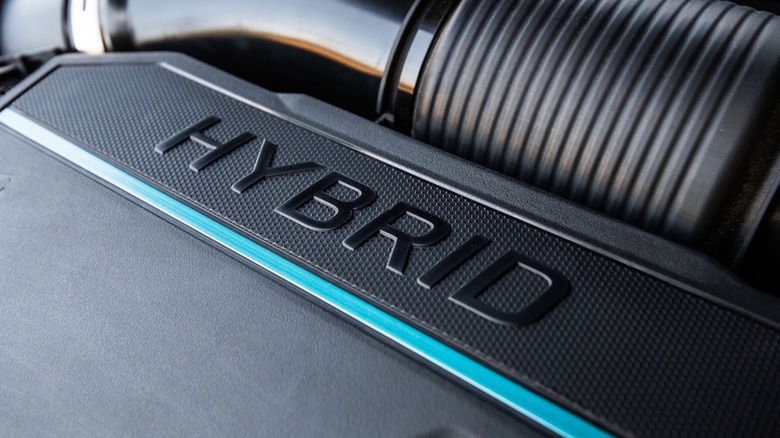5 Things To Consider Before Buying A Hyundai Tucson (According To Owners)
For crossover shoppers, the Hyundai Tucson checks many boxes: comfortable accommodations for five, moderate pricing, available technology upgrades, and an appealing warranty. It's a compact SUV that takes on heavy competition, including the Toyota RAV4 and Honda CR-V, and is Hyundai's most popular vehicle. Through August of 2025, the automaker sold almost 150,000 examples in the U.S., outselling the Elantra and Santa Fe by 44 percent and 60 percent, respectively. Available hybrid and plug-in hybrid powertrains also add to the Tucson's appeal and sales success. However, buying a new or used Hyundai Tucson without knowing some of its shortcomings can lead to dissatisfaction down the road.
With this in mind, we've highlighted a few Tucson drawbacks that the average car buyer may not be aware of. These trouble spots include a new car warranty with one major caveat, technology that's not always perfect, known Tucson engine problems, and underwhelming hybrid fuel economy.
Warranty transfer limitations
Hyundai gets high marks for its new car warranty program that provides bumper-to-bumper coverage for five years or 60,000 miles and powertrain protection for 10 years or 100,000 miles. This coverage tops what many luxury brands offer, but there's a big catch: the powertrain warranty doesn't transfer to any subsequent owners. Only the original bumper-to-bumper plan covers future Tucson owners (or owners of any Hyundai, for that matter).
This isn't well-publicized and can lead to confusion among owners and buyers. In a Reddit discussion, one Hyundai owner found out the hard way, buying a used model only to have the transmission fail at 63,000 miles. Another Redditor in the same conversation remarked, "I've never heard of the power train warranty not transferring." Yet, that's exactly the case with Hyundai.
Used Hyundai shoppers should also know that the coverage terms for subsequent buyers reflect whichever comes first: five years or 60,000 miles. With the average American driving about 13,500 miles annually, a used Hyundai Tucson may not be covered for the full five years.
Apple CarPlay and Android Auto confusion
Smartphone connectivity is a must-have feature for many drivers, but some Tucson owners were surprised to learn that the syncing method for Apple CarPlay and Android Auto varies by the infotainment system. The larger 10.25-inch touchscreen system with integrated navigation, which usually came with higher-end trims, requires a wired connection. Meanwhile, the base eight-inch display supports wireless connectivity. It's another sore point that gets discussed on Reddit. Tucson owners also mention using a third-party wireless dongle and adapter kit to enjoy cable-free smartphone connections.
Hyundai didn't bury the disparities between infotainment systems, but prospective buyers had to know where to look for the details or even be aware of the differences. Plus, this is a more recent phenomenon. Although the Tucson has had Apple CarPlay and Android Auto since 2017, those systems only used wired connections. The launch of the third-generation Tucson for the 2022 model year introduced the two touchscreen and connectivity options. Hyundai addressed this issue with the 2025 Tucson, making wireless Apple CarPlay and Android Auto standard across the trim range. This SlashGear first drive provides more insights into the 2025 Hyundai Tucson.
Ventilated seats have mixed results
The Tucson has come a long way in two decades, with each generation adding more upscale features. One such upgrade is ventilated front seats, introduced for the 2017 model year. This may not matter to every driver, but for those in hot climates, the feature can significantly improve comfort. Yet, Tucson owners give these seats mixed grades.
An owner of a 2025 Tucson Limited Hybrid remarked on Reddit, "The ventilated seats function seems to be very subtle. There are times when I can barely feel it and sometimes when I can't feel at all." Similar comments mention that the seats aren't cool enough for everyone's liking. But not everyone feels shortchanged. Another owner in the same thread countered, "I run super hot and actually really like them. They provide enough cooling to make me turn down the actual AC." Tucson buyers wanting ventilated seats may want to ensure the coolness level meets their needs.
Tucson engine issues are good news and bad news
From 2010 through 2021, certain Tucson models were equipped with powerplants infamous for connecting rod bearing failure. It's a common problem with the Hyundai (and Kia) Theta engines, along with the Nu 2.0-liter units. Hyundai issued a 15-year or 150,000-mile extended warranty on the engine, which starts from the original sale date but covers subsequent owners. The extension requires installing a knock detection sensor, which Hyundai dealers will do for free.
Tucson owners have shared their successes in taking advantage of the warranty. One Redditor said, "My engine was covered! They towed my car free... gave me a car to drive while mine was in the shop...replaced my engine, and were simply amazing with the whole situation!" Meanwhile, others expressed doubt about getting their dealer to honor the warranty or actually being able to reach a dealer for help. Owners and prospective buyers can visit the dedicated Hyundai website to determine if a particular Tucson qualifies for the warranty extension.
Hybrid fuel economy expectations versus reality
Some Tucson hybrid owners complain about fuel economy; what's promised doesn't match real-world experiences. One Redditor shared, "I just bought a brand new 2025 Hyundai Tucson Hybrid Limited...I'm currently averaging around 26mpg!...I'm shocked at how different my mpg are compared to the advised numbers! EPA-estimated combined fuel economy for this model is 35 mpg. Other owners say that new car break-in periods, driving habits, and cold weather can hurt fuel economy, highlighting why it's useful to know ways to avoid wasting fuel.
However, the disappointment with the fuel economy is repeated by the owner of a 2023 Tucson hybrid on Hyundai-forums.com. Commenter dgs1899 said, "I have around 19,000 miles and do a lot of highway driving... During the summer I usually get around 31–31.5 highway mpg. Recently... my mpg has dropped to around 27.5... My latest trip the mpg was 24.6... This mpg is nowhere near the 36 shown on Hyundai's website and quite shocking how poor it is..."
